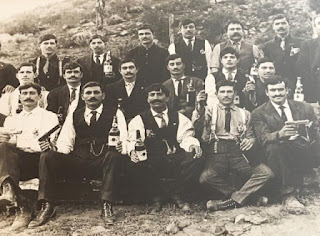ΜΠΑΜΠΑ, ΠΟΤΕ ΘΑ ΠΑΜΕ ΣΤΗΝ ΠΑΡΕΛΑΣΗ;
The night before my first parelasi, I couldn’t sleep. On the couch by my bed, my mother had laid out the costume my aunt had brought for me a few months before from Greece. As she ironed each pleat of the foustanella to perfect crispness, my mother observed: “You will wear this and you will be like Kitso Tzavella.”
The prospect of assuming the prospect of a long dead hero of the Revolution was particularly appealing to me, not only because my great-grandmother hailed from Souli and was purportedly kin to the Tzavellas clan, but also, because I would finally get to join the immense mass of similarly clad compatriots, marching in step to the Shrine of Remembrance. For this reason, I could not understand my cousins’ universal consternation at donning what they considered to be a dress. Being permitted to participate in the parelasi was for me, more than just wearing the attire of my ancestors. It was a formal induction into a community and into a nation far broader than the comfortable confines of my family and my extended kinship networks. It was the day I became a member of what we term as: “the paroikia.”
I proudly carried a placard that bore the likenesses of various heroes of the Revolution and excitedly examined the regional differences between the rich costumes worn by “the big kids.” As I marched past the dignitaries, I felt my chest swell with pride. “Look at all of us,” I thought. “Look how grand, how proud we are.” At that moment, for the first time in my life, I understood intellectually, the importance of belonging to the Greek discourse.
My sister joined me when she was two. As we were not able to procure a costume for her in time, she wore the foustanella in which I made my own debut. With her long curly hair and her chubby cheeks, she was an instant sensation. Three decades on, we still march side by side, I proudly, she indulgently, for she would do anything for her brother and her nieces and nephews, though I sense that her authentic heavy woollen costume from Zagori lends credence to her view that intrinsic to the Hellenic paradigm, is the concept of suffering.
My daughters also joined me when they each turned two, excitedly wearing their aunt’s costume, the eldest, Eleni, determined that she embodies Eleni Botsari, and the youngest, Alexandra, believing that she represents the spirit of Despo Tzavelaina, family members, at least in lore. Instead of the flag of Northern Epirus which I have been holding aloft for so many years, I now held my children in my arms, marching past my people and the dignitaries, our attire denoting our respect and deep knowledge of the significance of our past, our arms, literally, embracing the future.
Turning to me, two year old Alexandra asked in wonderment: «Μπαμπάόλοι αυτοί είναι ελληνικοί, σαν και εμείς.;»
«Έλληνες είναι», I replied. In one short question I realised just how important the parelasi is to identity formation in Melbourne. This is what Greeks do. To do so, is to be Greek. Of course the definition of what it is to be a Greek is broad and all embracing encompassing all those who wish to join our ranks. Joseph Haweil, the former mayor of Hume has proudly donned the foustanella and marched with us for several years. One year, the Panepirotic Federation’s contingent of marchers was primarily comprised of members of the Assyrian community, who wanted to join. Observing the fluid boundaries of identity as these are manifested in the march to the Shrine, is thus a breathtaking experience.
My son doesn’t know what the parelasi is. When he turned two in 2020, Coronavirus hit our shores and the parelasi was cancelled. On 25 March that year, we dressed up in our full regalia and marched up and down our street singing the Greek National Anthem, to the delight of our predominantly Italian neighbours, who came out onto the pavement to applaud the kids as they marched past. My son was thrilled.
“That’s nothing,” his sister Alexandra informed him. You should see the real parelasi. Thousands of people, marching in front of the ‘Parthenon.’”
“It’s not the Parthenon, it’s a Mausoleum,” the eldest, Eleni corrected her. My son sat wide eyed as his sisters relayed their experiences to him. Unlike them, growing up in the time of Corona, he has no memory of the experience of mass crowds of people and their words appear to him as if from a fairytale.
Nonetheless, every so often he will ask me: «Μπαμπά, πότε θα πάμε στην παρέλαση;».
Sadly, the Parelasi, one of the key events in Melbourne’s Greek calendar will not take place again for a third consecutive year. The Organising Committee, sensitive to the community’s concerns about the pandemic, sent out a survey to all participating schools and organisations in order to gauge their interest. The results are quite confronting. Only 5% of the schools and organisations stated that they were willing to participate in the march this year. Consequently, with 95% of those surveyed turning in a negative response, this hallowed event cannot take place even though there is no regulatory impediment to its staging.
It is fair to say that two years of lockdowns have served to erode age-old traditions and social habits within our community. Apart from those who are fearful of contagion despite the pervasiveness of the state vaccination program, there are those who, emerging from social isolation, no longer have any desire to attend or participate in any social events organised within our community. Many community organisations who are currently attempting to resume their activities all complain of the same phenomenon: “There just is no longer the interest out there, or the desire to associate. People don’t see the point. Many can no longer be bothered leaving home. COVID has broken us.”
I would like to think that the Greek community is much more resilient than that. I would like to think that this reticence to resume our previous activities is only a transient phase that will dissipate within a year. Yet habits formed are habits retained and if we do not make a conscious effort to regain the momentum lost as a result of the pandemic, our entrenched torpor will spell the end of all of the amazing events that engender in this city, a sense of the Greek identity, uniquely relevant to our place of abode and our lived experience as an ethnolinguistic component of the broader Australian social fabric.
The Parelasi is not just a parade. It is not an event to be dragged to unwillingly and picked up from as soon as one’s progeny marches past. It is a statement of survival, a manifestation of resilience, a prayer for justice and equality, a commitment to continuity, a declaration of identity. We must not and cannot afford to let it lapse out of complacency, indifference or fear. We cannot allow any further generations of children to grow up without being exposed to this supreme identity forming, community engendering tradition. Let us, as a community, re-affirm our resolve to ensure that next year, we come out in force, supporting the selfless work of the National Day Celebration committee, lest we, as T S Elliot’s Hollow Men, are forced, sooner than we may like to, to observe: “This is how [our] world ends. Not with a bang but a whimper.”
DEAN KALIMNIOU
kalymnios@hotmail.com
First published in NKEE on Saturday 26 February 2022.




